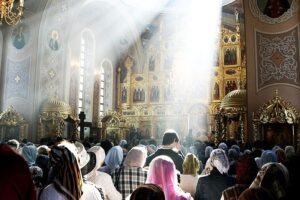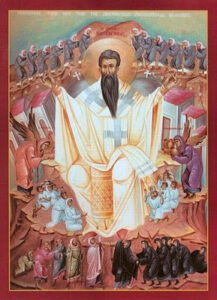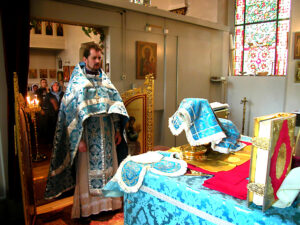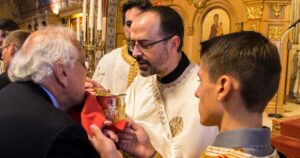
Heaven on earth
When we spoke last week of our being “lifted up” into Heaven, no doubt you noticed that you did not ascend into the sky. Heaven is not literally “up there” somewhere. Or perhaps in a strange way it is, since “up” from our round earth is infinite, “everywhere”! But Heaven is even beyond that. Heaven is “super-dimensional”, beyond our three dimensions, beyond our cosmos. That is how, as a Vespers Aposticha verse says, Christ could “come to earth without leaving Heaven”. Should God’s “will be done on earth”, then earth would be Heaven, the Paradise of Eden again – and more.
The Divine Liturgy gives us a taste of being in Heaven while still on earth, of Heaven “coming down” to us. Likewise in the Liturgy we do not leave “earth time”, but rather our time is transcended, swallowed up into eternity. Do we always “feel” this, sense this, at Divine Liturgy? No. Sometimes we are so dull or pre-occupied that we don’t give Heaven and eternity a chance. Nevertheless, many have experienced this. I have. When I was still able to preside at Liturgy I knew I was still in Cedarburg, Wisconsin, trying to be sure I said the right prayers, and off to the side I could see time passing on the clock in the vesting room. Yet often there in the Altar I was also Somewhere Else, in an entirely different Time.
Saint Basil’s Anaphoral Prayer continues:
Again, we’ll have to omit much.
Our offering of bread and wine is now seen to be the Body and Blood of Christ, mystically radiant with His presence.
Now comes a part of Saint Basil’s Liturgy which few people ever hear. Even when priests say the rest of the Anaphora aloud, often they do these prayers quietly and quickly, while the choir sings and covers it up. Too bad. For this is important.
These are a long series of intercessions and commemorations. All classic Orthodox Liturgies include this here. I’m no liturgical scholar, so I don’t know why. But here is how it seems to me: Now that we are in Heaven, we are allowed to pray with all those who have fallen asleep before us. And not only to the saints but also with the saints, if only for a few minutes: forefathers, fathers, patriarchs, prophets, apostles, preachers, evangelists, martyrs, confessors, teachers and every righteous spirit which has completed this life in faith. Especially our all-holy, immaculate, most blessed and glorious Lady the Theotokos and ever-virgin Mary to whom we sing this hymn:
Saint Symeon’s Orthodox Church, (OCA), Birmingham, Alabama
As for the intercessions, it seems as if Saint Basil includes everyone he can think of. Here’s an excerpt: Your holy, catholic and apostolic Church…to the ends of the world, those who have set before You these gifts, those who bear fruit and do good works in Your holy churches and who remember the poor, those in the deserts, the mountains and in caverns and pits of the earth, those who live in virginity and in asceticism, civil authorities, armed forces, the people here present and… those who are absent for reasonable cause, the married, infants, the young, the aged, the fainthearted, those wandering astray and vexed by unclean spirits, those who journey, widows, orphans, captives, the sick, those under judgement, those who love us and those who hate us, those…who have enjoined us…to pray for them, those whom we have not remembered, for this city and every city and countryside, our Metropolitan and our Bishop, the honorable presbytery, the diaconate in Christ and every priestly order…
 Why did he include so very many intercessions? Because these were people he knew. Basil had taken his considerable inheritance and used it to found a city for the poor outside Caesarea, where he was bishop. It included hospitals, hospices, food kitchens, hostels for poor travelers, a leprosarium and more. Furthermore, he left his episcopal residence and instead lived in that city with the needy. He knew them personally and cared about them, and so now, standing at the Heavenly Altar, he prayed for them – as he still does.
Why did he include so very many intercessions? Because these were people he knew. Basil had taken his considerable inheritance and used it to found a city for the poor outside Caesarea, where he was bishop. It included hospitals, hospices, food kitchens, hostels for poor travelers, a leprosarium and more. Furthermore, he left his episcopal residence and instead lived in that city with the needy. He knew them personally and cared about them, and so now, standing at the Heavenly Altar, he prayed for them – as he still does.
Furthermore, I think here is what it will be like for us when (by God’s grace, if we accept it,) we finally pass beyond this earthly life into the Heavenly Kingdom, and have unlimited time to pray for everyone. (Can you imagine?) This is how we will pray.
Even now, Saint Basil sets a pattern for our intercessions. Do you want to know how to pray? who to pray for? Then get a copy of Saint Basil’s Liturgy and read and learn. No, pray it with him.
His Great Anaphoral Prayer concludes. Towards the end the priest asks humbly that “my sins” may not hinder “the grace of Your Holy Spirit”. He prays for temperate and healthful seasons, for deliverance from schisms and the ragings of hostile nations and uprisings of heresies… Finally receive us all into Your kingdom, showing us to be sons of the light and sons of the day; and grant to us Your peace and Your love, O Lord our God, for You have given all things to us.,,, that with one mouth and one heart we may glorify and praise Your all-honorable and majestic name of the Father, and of the Son, and of the Holy Spirit, now and ever and unto ages of ages. Amen.
I don’t mean to sound irreverent, but my reaction to the “cosmic sweep” of Saint Basil’s Anaphora is always “Wow!”
So much pop religion today is narrow and self-centered, concerned chiefly about “me” and “my salvation”, or perhaps with my fulfilling myself. At best it may rise to the interests of my kind of people or my country. But the Anaphora of Saint Basil is all encompassing. It unites us with all people who live on earth, and all who have gone before us, praying that all people and all things may be redeemed, renewed and lifted up into the Kingdom.
 Serbian Orthodox Church, Dusseldorf, Germany (by Velopilger)
Serbian Orthodox Church, Dusseldorf, Germany (by Velopilger)
The Anaphoral Prayer concludes, as do all classic Liturgies, with the “Our Father”, the “summit” of Christian prayers, wherein there’s too much to talk about now. Except for this: Our English “Give us this day our daily bread” is an inadequate translation. Of course we should pray for our daily material needs, but the Greek επιούσιον (epiousion) means not “daiiy” but “super-substantial”, spiritual, Heavenly. In other words: “Give us this day Christ who is the Bread of Life”.
Receiving the Holy Eucharist
For the remainder of the service, Saint Basil varies from Saint John Chrysostom only in minor details.
The Priest breaks the Bread. Then comes something unique to our Byzantine Liturgy: he blesses hot water and pours it into the chalice. The water is called Zeon / ζέον (“fervor”, “boiling”!). Its original purpose has been forgotten, but it has taken on symbolic meaning: The Priest says quietly The warmth of the Holy Spirit. (One would think the Epiklesis would have been sufficient for this. Can anyone here explain?)
The Priest quietly says several prayers of preparation, concluding with these three lovely ones. In many places the people also now say these aloud:
I believe, O Lord, and I confess that You are truly the Christ, the Son of the living God, who came into the world to save sinners, of whom I am chief. And I believe that this is truly Your own immaculate Body, and that is truly Your own precious Blood. Wherefore, I pray, have mercy upon me, and forgive my transgressions both voluntary and involuntary, of word and of deed, of knowledge and of ignorance; and make me worthy to partake without condemnation of Your immaculate mysteries unto remission of sins and life everlasting. Amen.
Of Your mystic supper, O Son of God, accept me today as a communicant; for I will not speak of Your mystery to Your enemies, neither will I give You as kiss as did Judas; but like the thief will I confess You: Remember me, O Lord, in Your kingdom.
Not unto judgment nor unto condemnation be my partaking of Your holy mysteries, O Lord, but unto the healing of soul and body.
How often we should receive the Holy Eucharist?
Let’s begin with this: Christ commanded us to Take…eat…drink them, not just to watch them. In the early Church Christians normally received Holy Communion every Sunday. However, In those days there was little doubt people were prepared to receive them, since persecution could begin at any time, and few were Christians unless they were serious about it. Then for many centuries, after the Church was established, Christians received the Eucharist only occasionally. In some Orthodox churches (and in many Protestant denominations) this is still the case. In recent times Orthodox are receiving  Communion more frequently.
Communion more frequently.
I think this is a good recovery. However, I think we should be very careful about this.
Saint John the Baptist Greek Orthodox Church, Anaheim, California
To begin: We should take seriously Saint Paul’s warning that whoever eats this Bread or drinks this Cup in an unworthy manner will be guilty of the Body and Blood of the Lord… and eats and drinks judgment to himself, not discerning the Lord’s Body. I Corinthians 11:27,29
Paul certainly did not mean we should receive Communion only if we are morally worthy, without sin. In that case no one could ever receive except the Lord and his Mother! Holy Communion is not a reward for good behavior; it is God’s way of making us good.
Worthy reception means, first, that we should come to the Holy Eucharist in faith, aware of Christ’s presence in Holy Communion (the Body of Christ) and also in the Church community (the Body of Christ). A woman from our parish once had a friend who on Saturday told her she was an atheist, then on Sunday she received Holy Communion. “Why did you do that?!” asked the woman from Saint Nicholas. Her response: “Because I’m Greek!” (Any ethnic heritage could be substituted here.)
Regarding Christ’s presence in the Church: When the priest first announces the Holy Eucharist to the people, he elevates the Bread saying “Holy Things for Holy People”. This also doesn’t translate well into English. The Greek is Τὰ Ἅγια τοῖς ἁγίοι”, literally “The Holies for the Holies”. This declares an equivalence of Holy Communion and God’s Holy People. No matter how much we reverence the Holy Eucharist, if we are not treating people right, we are not prepared to receive Communion. Worthy reception requires a heart that seeks the good of others, has forgiven them (or is trying to do so) and is truly seeking God and goodness.
Should I mention, in passing, what a joyful terrible burden this places on your priest who must receive the Holy Eucharist every Sunday?
The ways of preparation vary somewhat among Orthodox jurisdictions. (If you’re unsure, ask your priest about this.) It should always include some pre-Communion prayers, repentance (sacramental Confession is required in some places), fasting from food and drink after midnight (unless health doesn’t permit), attendance at the full Liturgy or some say by the Gospel reading at the very latest. (Consider grandma’s reaction if Sunday by Sunday you should pop in for her Sunday dinner just in time for desert.)
How often should you receive? That is for you and your spiritual advisor to decide. I say as often as possible, so long as you take care not to receive casually, lest you receive it to your judgement – for this is “fire burning the unworthy”.
In Holy Communion we eat and drink the Body and Blood of Christ. We have done this so often that we sometimes don’t remember what a very strange thing this is. When Jesus first said I am the living bread which came down from heaven. If anyone eats this bread he will live forever… Unless you eat the flesh of the Son of Man and drink his blood, you have no life in you, many began to take offense and turned away from Him. John 6:30-69 But what a wonderful gift! – that Christ gives Himself to be our food and drink – for finally there is no strength, except in Him. And what a frightening gift! that Christ our God comes and dwells in us, so that our lives are no longer our own. We have no right to do as we please. Now we are His presence in this world.
The Meaning of the Holy Anaphora
Can you see here how God works in our lives?
First, have you noticed: the Divine Liturgy has formal entrances, but no formal exits! Sunday by Sunday, week by week, we move “further up, further in” to the Kingdom of Heaven. And by the grace of God we will never leave.
At each Liturgy we offer to God what He has given us, the ordinary things of our life and labor under the forms of Bread and Wine. He receives them, and they become Christ’s Body and Blood. What we give Him He returns to us magnified infinitely. We offer ordinary food and drink. He gives us “the Bread of Heaven, the Fountain of Immortality”. We offer Him our earthly lives, He gives us eternal life. This is what our life in Christ is all about.
So we receive our Sunday Communions and live the week in the presence and power of Christ. We return the next Sunday to offer God a life that, by His grace, should be holier and more acceptable, an even better offering. Then we receive His grace again… and so on and on unto ages of ages. Amen.
from Orthodox Christian Chants, sung by Anna Seidel – arrangement by His Grace Bishop Basil of Antiochian Diocese of Wichita
Next Week: Our Mother Mary of Egypt – REPENT!
Friday April 24, for Lazarus Saturday. We begin our regular daily Holy Week Commentaries